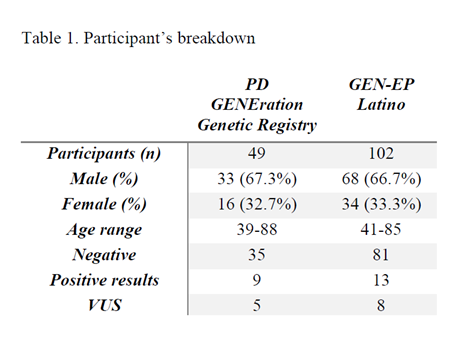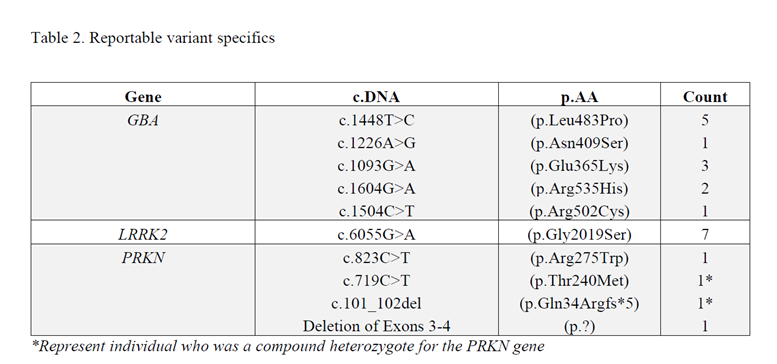Category: Parkinson's Disease: Genetics
Objective: To report preliminary genetic findings of Hispanic participants from the PD GENEration Registry and GEN-EP Latino study.
Background: The incidence of Parkinson disease across the globe is steadily increasing; unfortunately, our understanding of the genetics of this complex disease has remained stagnant due to the unequal representation of ethnic minorities in genomic research which obscures the understanding of genetic variations across population. [1]
Method: The PD GENEration genetic registry offers people with Parkinson’s disease (PWP) in the US and Puerto Rico CLIA-certified genetic testing through next-generation sequencing of 7 high interest genes (LRRK2, GBA, SNCA, PRKN, PARK 7, PINK1, VPS35) linked to monogenic Parkinson disease (PD). The GEN-EP Latino initiative in the Dominican Republic is offering the same gene panel from Fulgent Genetics, but for the first time outside of the US. Per study protocol, pathogenic/likely pathogenic PD variants are reported to participants as well as secondary findings from genes in the American College of Medical Genetics Incidental Findings list. All Spanish speaking participants have the possibility to go through the whole study pipeline in their native language, which would include genetic counseling for their results disclosure in Spanish
Results: To date, 151 results have been reported to participants (49 from PD GENEration genetic registry and 102 from GEN-EP). A total of 22 participants were identified carrying a well-known pathogenic/likely pathogenic PD variant representing 14.5% of all individuals tested (18.3% and 12.7% respectively) [table1]. More than half (54.5%) presented with a variant in GBA, followed by LRRK2 (31.8%) and PRKN (13.6%). Reportable variants are presented in [table2]. In addition, 13 (8.6%) participants carried a variant of unknown significance (VUS) in at least one of the 7 genes.
Conclusion: Additional efforts to recruit Hispanic participants into genetic research are crucial for the advancement of our understanding of PD genetics. At the same time careful steps need to be taken as data is analyzed. The current data available is from a preliminary analysis and is subject to biases that need to be teased out as analysis continues. For example, GBA variant frequency may be inflated due to the recruitment of family members into the study and in turn enriching the whole data set.
References: [1] Loesch, D. P., Horimoto, A. R., Heilbron, K., Sarihan, E. I., Inca‐Martinez, M., Mason, E., … & Latin American Research Consortium on the Genetics of Parkinson’s Disease (LARGE‐PD). (2021). Characterizing the genetic architecture of Parkinson’s disease in Latinos. Annals of Neurology, 90(3), 353-365.
To cite this abstract in AMA style:
P. Delgado Hodges, R. Deleon, A. Naito, R. Cruz Vicioso, A. Viñuelas, F. Velez Lago, L. Forastieri, I. F Mata. Closing the gap: Increasing access to genetic testing and counseling for Hispanics through PD research [abstract]. Mov Disord. 2022; 37 (suppl 2). https://www.mdsabstracts.org/abstract/closing-the-gap-increasing-access-to-genetic-testing-and-counseling-for-hispanics-through-pd-research/. Accessed October 17, 2025.« Back to 2022 International Congress
MDS Abstracts - https://www.mdsabstracts.org/abstract/closing-the-gap-increasing-access-to-genetic-testing-and-counseling-for-hispanics-through-pd-research/


